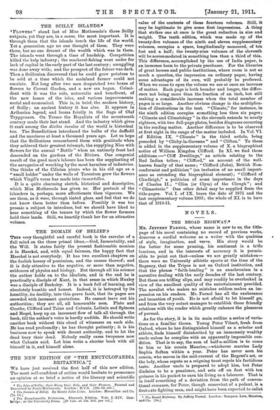'rah DOMAIN OF BELIEF.t Vara very thoughtful and careful book
is the exercise of a full mind on the three primal ideas,—God, Immortality, and the Will. It states fairly the present fashionable monism ai la Haeckel, and, with equal fairness, the happy fact that Haeckel is not everybody. It has two excellent chapters on the foolish heresy of pessimism, and the causes thereof; and it is duly attentive to the negative, or more than negative, -evidences of physics and biology. But through all his science the author holds on to the idealists, and in the end he is practically a disciple of Kant, in that sense in which Huxley was a disciple of Berkeley. It is a book full of learning, and absolutely humble and honest. Indeed, it is betrayed by its humility, its docility, into this grave fault, that its pages are crowded with incessant quotations. He cannot leave out his authorities ; they are all, all honourable men. Plato and Goethe, Clifford and Taine and Cabanis, Leibniz and Spinoza and Hegel, keep up an incessant flow of talk all through the book, till the author's voice is hardly audible. He should write .another book without this cloud of witnesses on each side. He has read profoundly; he has thought patiently; it is his business now to speak with decent authority, and to let the dead bury their dead. Nobody really cares twopence now what Cabanis said. Let him write a shorter book with all himself in it, and himself alone.










































 Previous page
Previous page